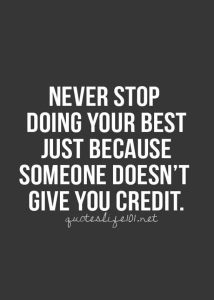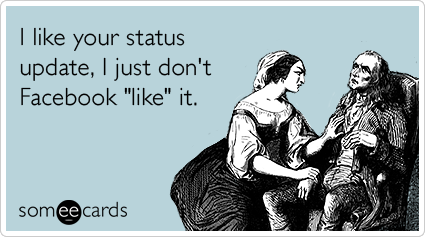“I only got ten likes in the last five minutes/
Do you think I should take it down?”
–Girl in that Chainsmokers song
—
Whether it’s inherent or a result of our current digital climate, the amount we (myself included) feed off of positive feedback is alarming. More startling is that the feedback many of us seem to crave most is from people that would otherwise be irrelevant to us if not for social media.
Likes, retweets, and positive praise can easily become the currency of our self-esteems when gone unchecked. I hear it talked about amongst peers and coworkers enough to assume that most are aware of this phenomenon; the involuntary Facebook checks, the obsessive wondering of how many likes on your new Instagram photo, the general digital FOMO.
While being constantly distracted by your phone or inbox is one thing, I think the real trouble begins when this starts to extend off the screen into our personal relationships.
The Proof Is In The Liking
Online, it’s very tangible to know where people stand. They click a button or make a comment of praise, and then it’s there forever to look back on, some sort of physical proof of approval.
Unless you and your closest connections are in the habit of writing physical notes to one another, actual relationships are not quite as material and the proof of approval can be less-obvious. The foundation is more trust-based as opposed to endorsement-driven.
However, voiced words can be craved just like favorites and retweets. They certainly mean something, and almost always more than general Facebook praise. At the same time, their meaning and weight varies from finite to eternal depending on the source and context. Anyone who has ever had a bad breakup can attest to all the wonderful and then-authentic things that their SO once said, but that now seem like nothing more than empty lies.
All of this praise, it provides a high, a rush of dopamine that is amazing and wonderful in the moment yet can leave someone too attached to the feeling over time, craving more extremely quickly. In my experience, affirmation addiction on social media only worsens these cravings offline.
In one of my last relationships, I became addicted to the positive praise I received. I’ve never told anyone this—even this person—but I kept a Word document of some of the things she said that made me feel good.
Creepy? Maybe a little. However the good intent was there, as I was trying to just provide myself some sort of proof about how this person felt when I had doubt about the relationship. While it was a nice idea and served its purpose occasionally, I always wanted more and was never truly satisfied—a classic sign of addiction. I enjoyed the praise and the moment it came in so much that this was my way of trying to make it last.
While I am over feeling like I need to archive compliments from my relationships anymore, I felt that the idea could be useful in a way that was more than just an emotional crutch.
The Paradox of Becoming Socially Stronger
I recently finished reading Steal Like An Artist by Austin Kleon (an extremely quick read and the best summary of the creative process I have ever read).
One of the ideas in the book is to keep a “praise file” for when artistic doubt inevitably creeps in. Inside this Word .doc, Evernote, whatever, it suggests placing any compliments received about your work to look at when self-doubt is present. It’s a great idea, and did make me go and compile the few comments, Facebook messages, and emails I have received about my writing. I imagine the next time I find myself in steps 2-4 of the creative process, it will be useful in breeding some positive emotions and thoughts.
I think for those that have battled with both seeking approval and improving their social skills, this idea lends itself perfectly: making a list of positive experiences, interactions, and those small “social victories” where they felt completely like themselves and in a flow state. Especially in the beginning, reflecting on this list and just knowing that it exists is an extremely beneficial way for recovering shys to provide beneficial reinforcement to themselves.

The difficulty of it all is that anyone that wants to become more social, is in a way, wanting the approval of others in social settings. There is a certain level of positive feedback that is required to become more socially successful—there is obviously no way to increase your social awareness or know if something is a good conversation starter without paying attention to the emotions and actions of the other person in an interaction.
And herein lies the paradox: becoming socially free involves a large degree of not caring about the approval of others, yet the reason most want to develop their social skills is for their approval and acceptance.
Quite the circle, eh?
It’s a fine line, and for someone that struggles with social anxiety, it might take years to figure out that healthy balance (I know that was the case and occasionally still can be for me).
However, if the boundary can be made between keeping this positive feedback in a file (be it just a mental one) as positive reinforcement versus ego fuel and the sole reason for action, then I think this is an overwhelmingly positive thing for recovering shys to do.
Good Proof vs. Bad Proof
I’ve written before about the lasting power of a compliment, and while verbal praise doesn’t mean forever, it doesn’t change the fact that the compliment was about you.
 Contexts will change, that person will change, the relationship will change, you will change on some level—however that compliment was about a real part YOU, not a mirror bathroom shot, witty status update, or what you ate for lunch today. It was about something deeper, and forgive me for going off the existential deep end, about some sort of energy inside you that will always exist in some form or another. All these ever-changing variables do not make the praise any less valid or valuable as a reference point.
Contexts will change, that person will change, the relationship will change, you will change on some level—however that compliment was about a real part YOU, not a mirror bathroom shot, witty status update, or what you ate for lunch today. It was about something deeper, and forgive me for going off the existential deep end, about some sort of energy inside you that will always exist in some form or another. All these ever-changing variables do not make the praise any less valid or valuable as a reference point.
An example would be the random text message compliment about my charisma I received that I mentioned in the wrap up for 90 Compliments. I saved it as a screenshot, and while I’ve since backed up and erased all the photos on my phone, I know it exists somewhere. If I am having a day where I feel like a grump and am doubting that I’ve gained any sort of social skills over the years and am just full of shit, I will think back to it. It’s there, it was said unsolicited, and even if my social skills have actually regressed, it’s still an exhibit of my potential or capabilities.
—
It might seem like I am contradicting myself by saying that wanting approval on social media is negative but wanting it in person is good. However, if 90 Compliments taught me anything, it is that giving compliments can be genuinely difficult. And as a general rule of thumb for life, typically the most difficult things carry the most meaning in the end.
Verbal praise and having great conversation with someone is not a Facebook like or a starred post—it’s much better, and its value lasts much longer.
I am a work in progress with all of this like anyone else, learning to free myself from this affirmation addiction. However, through reading, meditation, and just experiencing more life in general, it has been one of the most rewarding struggles I have put myself through, similar to an addict starting to remember life before their dependence. Had I not learned to enjoy this battle, for instance, there is no way I would have ever sit down to write a 1300-word piece about my neediness, let alone put it out publicly let alone promote it on social media. *gasp*
In my experience, becoming socially stronger is much more than just learning social acuity. Counterintuitively, it’s more about just doing without any sort of desired outcome and just being you for the sake of being you.


